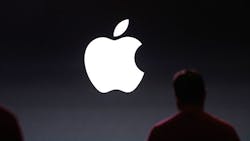Apple Says Goodbye to Osram, Hello to Philips in Top Suppliers List
Apple Inc. (IW 500/3) swapped out Osram Licht AG from a list of its biggest suppliers and added Royal Philips NV, part of a supply chain reshuffle ahead of the release of the iPhone 7.
The revision to the catalog of Apple’s top 200 parts providers is a boon to Philips (IW 1000/159) while it searches for a new buyer for its light-emitting-diode unit. It’s also a blow to the Munich-based Osram (IW 1000/626), which is investing one billion euros (US$1.4 billion) in a plant that builds semiconductors used to make LEDs.
LEDs are used not only in the flash for iPhone cameras, but also in infra-red sensors that detect a phone’s position against a user’s face and allow the Apple Watch to measure the wearer’s pulse. While Apple publishes a list of its top suppliers, it doesn’t specify which component comes from each company.
Osram and Philips declined to comment on the list, which Apple published Thursday. Bloomberg compared the companies that were new or dropped off. It doesn’t include all of Apple’s suppliers and some companies that are no longer in the top 200 may still be suppliers to Apple.
iPhone 7 Supplier Evaluation Opportunity
Apple released a smaller version of its iPhone this month, the ‘SE.’ Since the Cupertino, Calif.-based company will likely sell fewer of the handset than its larger cousins, the 6S and 6S Plus, the model presented an opportunity for Apple to try out new suppliers to evaluate their effectiveness ahead of the iPhone 7’s introduction later this year, according to Cowen & Co. analyst Tim Arcuri.
Apple often sources similar components from a range of suppliers, which can help it secure lower prices. Chief Executive Officer Tim Cook is an expert in supply chain management, and served as chief operating officer for six years before his current role.
Power management equipment-maker Eaton Corp. and LCD component supplier Seiko Epson Corp. rank among the other companies to fall out of the top 200 this year. Computer-makers Wistron Corp. and Compal Electronics Inc. jumped in. LED-maker Nichia Corp. retained its spot on the list of suppliers.
The high-profile Apple contract may help Philips boost the price for the Lumileds unit it’s trying to sell. The Amsterdam-based company was forced to scrap the planned $2.8 billion sale of the unit, which makes LED chips and automotive lights, to a consortium led by China’s GO Scale Capital Ltd. in January because of opposition from a U.S. regulator charged with vetting foreign acquisitions to protect national security. It’s now targeting a deal for the second half of this year.
Osram is meanwhile divesting its traditional lighting business in order to focus on LEDs. Chief Executive Officer Olaf Berlien wants to secure lucrative technology customers akin to Apple to reduce its dependence on the automotive lighting industry, where it’s the leader by market share.
He’s expanding a plant in Malaysia which builds semiconductor chips, a move which he has said will reduce manufacturing costs. Analysts have criticized the expansion for increasing Osram’s exposure to less profitable end markets.
By Alex Webb
About the Author
Bloomberg
Licensed content from Bloomberg, copyright 2016.
